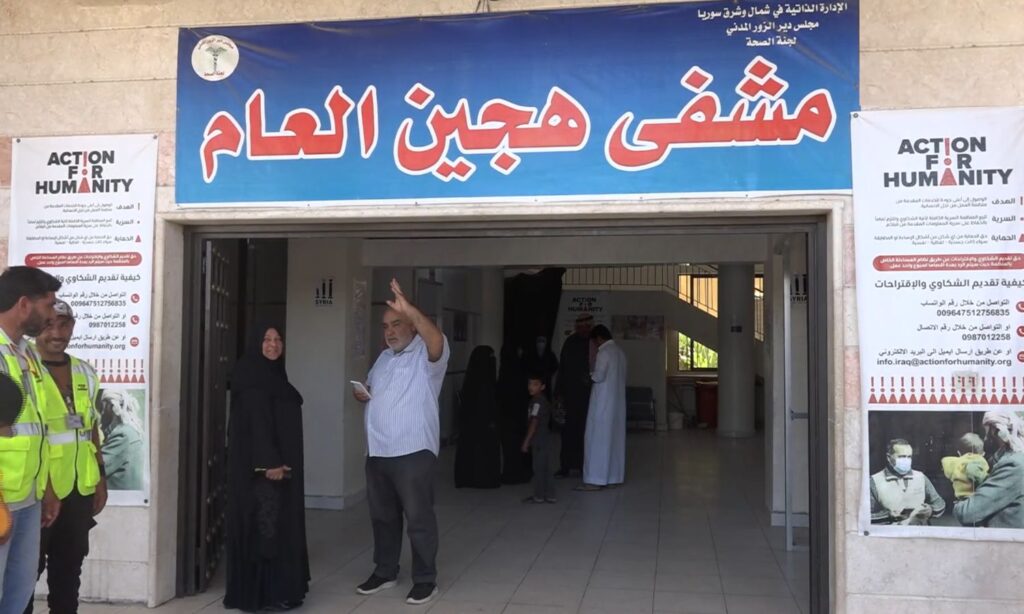The suspension of international support has led to the shutdown of vital departments in the eastern rural hospitals of Deir Ezzor, where the Autonomous Administration of North and East Syria (AANES) controls, amidst a pressing need for continued support and provision of medical care for patients.
The Mehad organization, operating in northeastern Syria, has halted its support due to the donor’s cessation. This halt has affected the Thalassemia department at Hajin General Hospital since the beginning of July and the dialysis department at Furat Hospital.
The medical staff and workers in both departments have announced their continued operation with limited capacities, emphasizing that maintaining these sections is a critical humanitarian need, especially for patients who require weekly dialysis, as there is no other center in rural Deir Ezzor.
A strenuous journey for treatment
Majd al-Tabash needs two weekly dialysis sessions at hospitals in Raqqa or al-Hasakah, having previously relied on Furat Hospital in Abu Hammam town, eastern Deir Ezzor.
Al-Tabash told Enab Baladi that his suffering has increased due to the lack of accommodation in al-Hasakah or Raqqa, coupled with the high treatment costs and house rents that may reach 1.5 million Syrian pounds ($100).
A responsible source at Furat Hospital (who preferred not to be named as he is not authorized to speak to the media) told Enab Baladi that the department had cared for 41 kidney patients.
The suspension of department support forced patients to bear the financial burden of traveling to Raqqa or Qamishli, costing around 1.5 million Syrian pounds ($100) for an ambulance.
The cost of each session varies between 230,000 and 460,000 Syrian pounds, depending on its duration and the patient’s needs. Some patients require three weekly sessions, while others need two, according to the source, adding that treatment is ongoing until the patient receives a kidney transplant.
Dr. Mashari al-Hazzoum, the general director of Hajin Hospital in Deir Ezzor, told Enab Baladi that the hospital provides various medical services around the clock, in addition to a blood bank, which is the only center offering these services in Deir Ezzor.
He mentioned that the most crucial department is the Hematology (Thalassemia) department, temporarily closed due to the cessation of support from the Mehad organization. This department provided free services for over two years, offering treatment to over 150 cases.
Al-Hazzoum pointed out that the Thalassemia Department and the blood bank are vital and essential departments serving the residents of Deir Ezzor. There is no other center for children with Thalassemia except in Raqqa city.
The hospital administration is coordinating with the Deir Ezzor Civil Council’s Health Committee under the Autonomous Administration and international organizations to reopen these essential departments.
Awaiting support
The medical staff in rural Deir Ezzor appeals to local and international organizations for urgent intervention and continued support to assist patients.
A responsible source at the Mehad organization in Deir Ezzor told Enab Baladi that the current lack of support has affected the salaries of workers in the dialysis department at Furat Hospital. There are only incentives left, and work is still ongoing, with a memorandum of understanding continuing until August 31.
The source (who requested anonymity as he is not authorized to speak to the media) mentioned that the contract would be renewed if the support continues.
As for Hajin Hospital, the Thalassemia Department, blood bank, and central laboratory were closed on July 1, with the organization handing the hospital over to the Deir Ezzor Health Committee under the Autonomous Administration.
The hospitals in rural Deir Ezzor under Autonomous Administration control lack many devices, expertise, and capabilities, in addition to equipment failures and power generator breakdowns, limiting services and doubling patients’ suffering.











